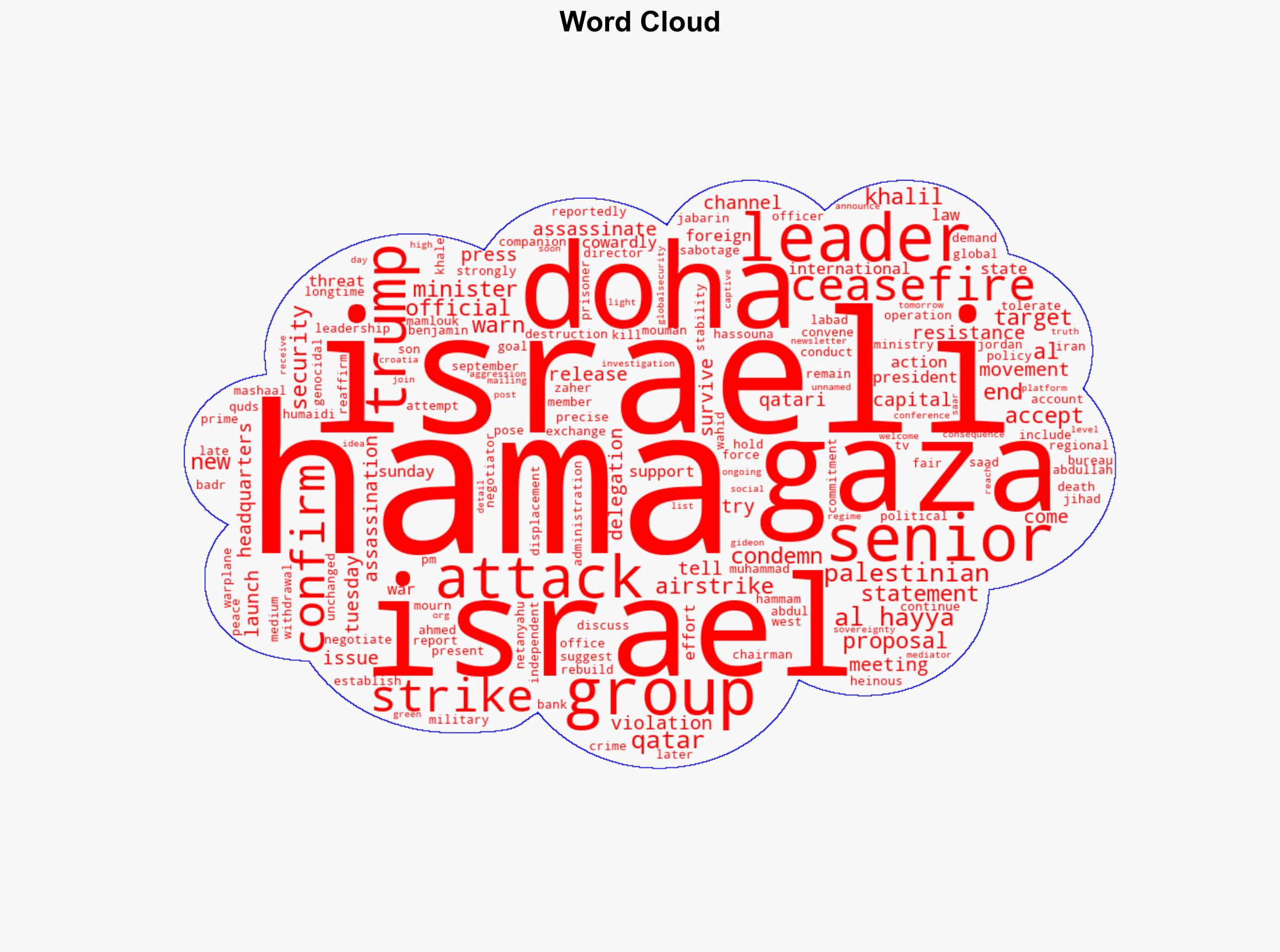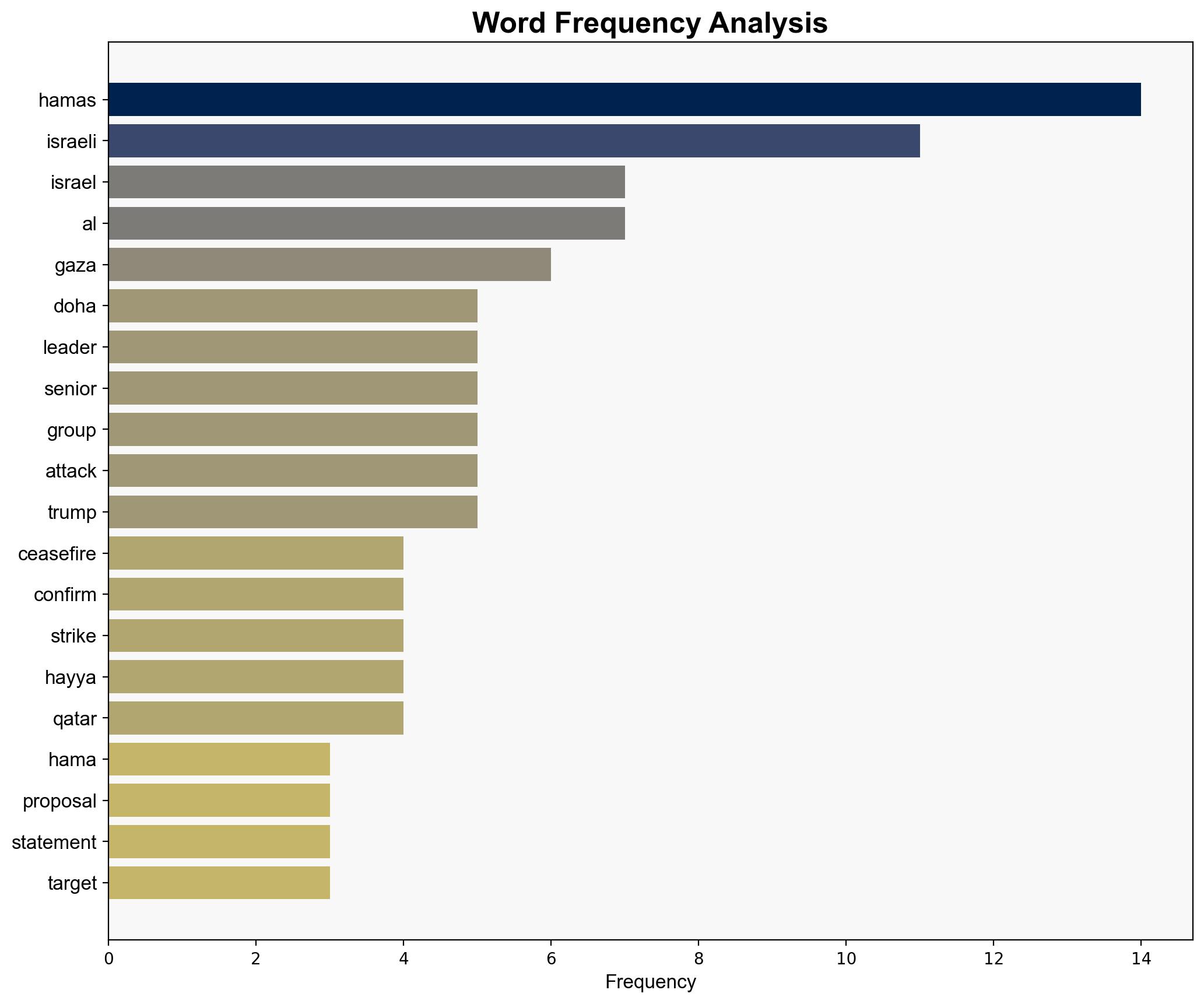Israel launches airstrikes on Doha to assassinate Hamas leaders – Globalsecurity.org
Published on: 2025-09-10
Intelligence Report: Israel launches airstrikes on Doha to assassinate Hamas leaders – Globalsecurity.org
1. BLUF (Bottom Line Up Front)
The most supported hypothesis is that Israel conducted the airstrikes in Doha with the objective of disrupting Hamas leadership and negotiations, potentially with tacit approval from the U.S. administration. Confidence level: Moderate. Recommended action: Monitor diplomatic communications between Israel, Qatar, and the U.S., and prepare for potential retaliatory actions from Hamas or its allies.
2. Competing Hypotheses
Hypothesis 1: Israel’s airstrikes were a strategic move to eliminate key Hamas leaders and disrupt their negotiation efforts, with possible U.S. approval.
– **Supporting Evidence:** Reports of Israeli confirmation of the strike, statements from Israeli officials, and alleged U.S. approval.
– **Contradictory Evidence:** Hamas leaders reportedly survived, and Qatar condemned the attack, suggesting a lack of coordination with regional allies.
Hypothesis 2: The airstrikes were a unilateral Israeli action aimed at demonstrating military strength and deterring Hamas, without explicit U.S. endorsement.
– **Supporting Evidence:** Strong condemnation from Qatar and lack of explicit U.S. acknowledgment of involvement.
– **Contradictory Evidence:** Reports of a U.S. official allegedly giving a green light, and Israeli officials referencing U.S. proposals.
3. Key Assumptions and Red Flags
– **Assumptions:** Israel has the capability to conduct precise strikes without significant collateral damage; the U.S. would publicly support or condemn such actions if involved.
– **Red Flags:** Lack of independent verification of the U.S. role; potential bias in media reporting from involved parties.
– **Blind Spots:** The internal decision-making processes within Hamas and Qatar’s security response capabilities.
4. Implications and Strategic Risks
– **Escalation Risks:** Potential for retaliatory attacks by Hamas or allied groups against Israeli or U.S. interests.
– **Geopolitical Impact:** Strained relations between Qatar and Israel, potential diplomatic fallout affecting U.S.-Qatar relations.
– **Economic Risks:** Disruption in regional trade and investment due to heightened security tensions.
– **Psychological Impact:** Increased fear and unrest among civilian populations in affected areas.
5. Recommendations and Outlook
- Enhance intelligence-sharing mechanisms with regional allies to anticipate retaliatory actions.
- Engage in diplomatic dialogue with Qatar to mitigate tensions and clarify U.S. involvement.
- Scenario Projections:
- Best Case: Diplomatic efforts lead to de-escalation and resumption of peace negotiations.
- Worst Case: Escalation into broader regional conflict involving multiple state and non-state actors.
- Most Likely: Continued low-level conflict with intermittent diplomatic interventions.
6. Key Individuals and Entities
– Khalil al-Hayya
– Zaher Jabarin
– Khale Mashaal
– Benjamin Netanyahu
– Gideon Saar
– Donald Trump
7. Thematic Tags
national security threats, counter-terrorism, regional focus, geopolitical tensions





